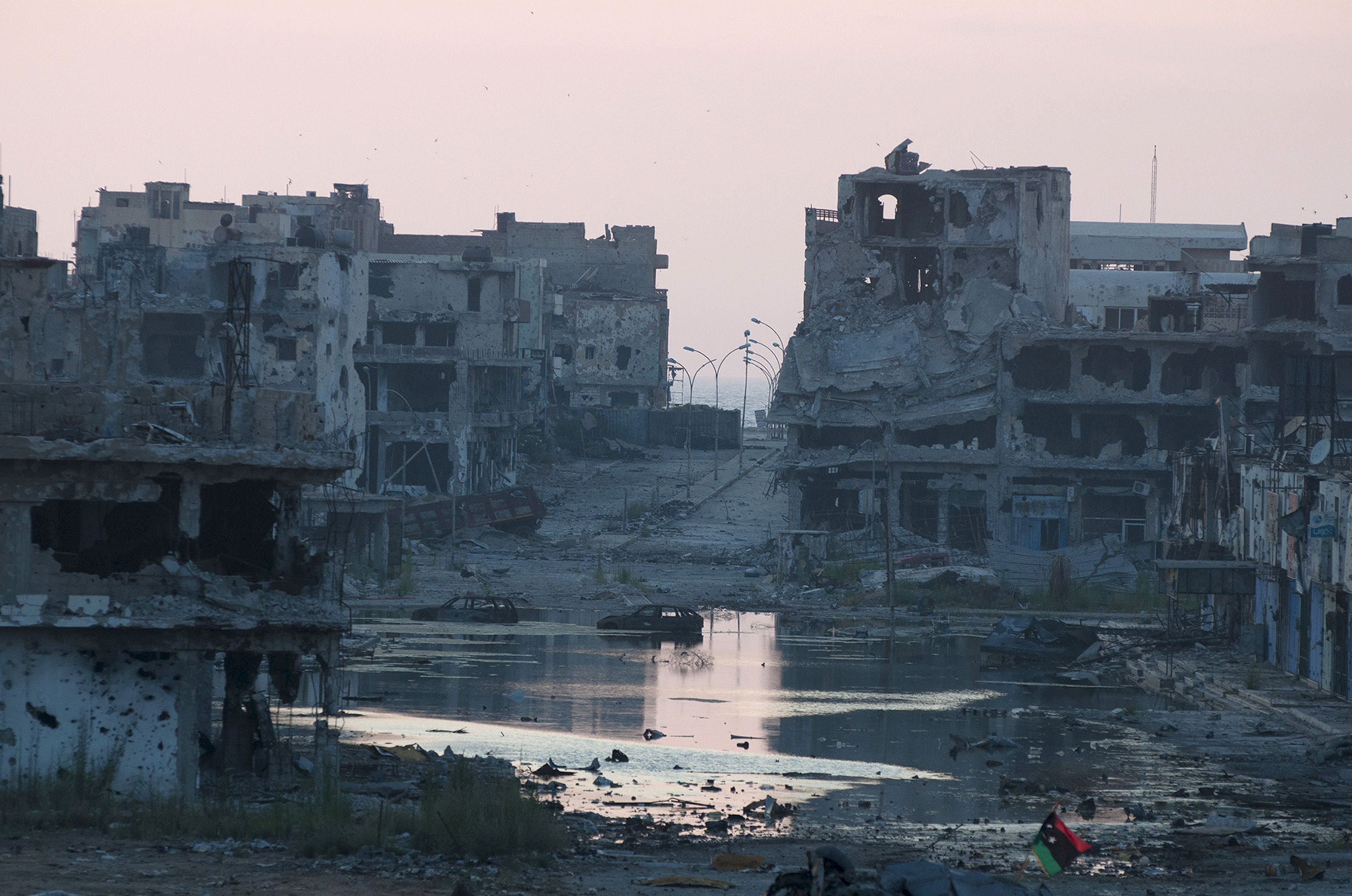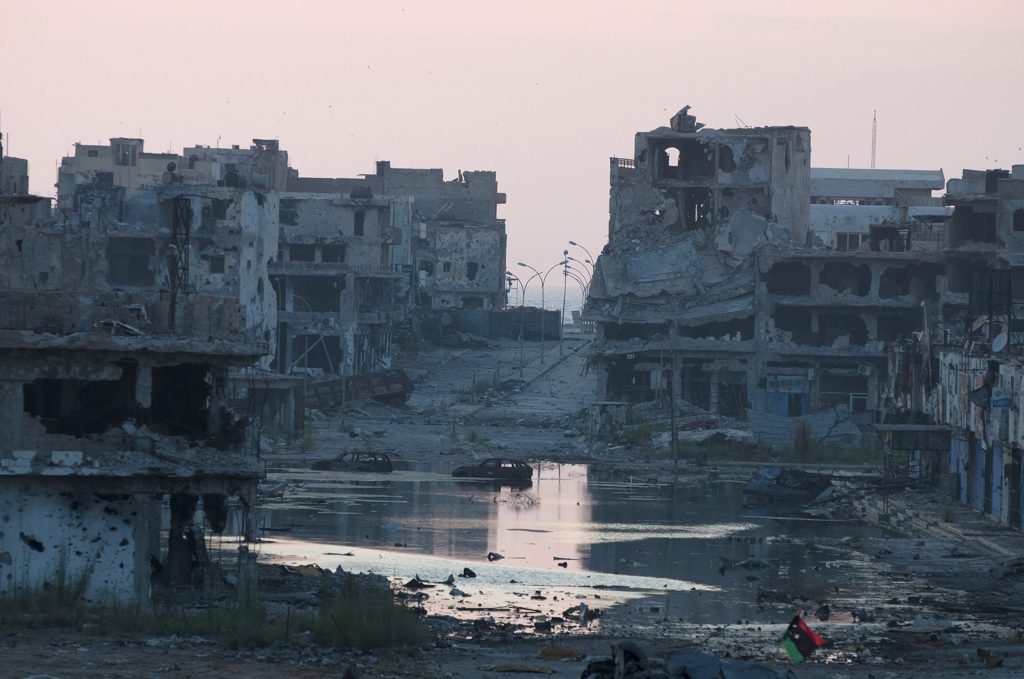
Atlantic Council’s Karim Mezran says new government in Tripoli risks falling into the same trap as its predecessors
Vague requests for assistance by the United Nations-backed government in Libya will undermine Western governments’ ability to stabilize the North African nation that has been plunged in chaos since the ouster of its longtime leader Moammar Gadhafi in 2011, according to the Atlantic Council’s Karim Mezran.
The European Union this week offered Libyan Prime Minister Fayez al Serraj and his Government of National Accord (GNA) assistance in the security sector, dealing with human trafficking networks that have funneled hundreds of thousands of migrants across the Mediterranean Sea and into Europe, border management, and building the capacity of the Libyan police. The EU, however, stopped short of saying whether it will conduct naval operations off Libya’s coast to deter the traffickers or put boots on the ground to contain the threat posed by the Islamic State of Iraq and al-Sham (ISIS). That is because the Serraj government did not explicitly make such a request.
Serraj’s predecessors—the governments of Ali Zeidan (2012-2014) and Abdurrahim el-Keib (2011-2012)—had also asked for foreign support in vague terms that “did not allow the international community to intervene effectively,” said Mezran, a Resident Senior Fellow in the Atlantic Council’s Rafik Hariri Center for the Middle East. “I am afraid that the same thing is happening now,” he added. The British government in March denied that it plans to deploy troops to support the Serraj government.
Mezran suggested that the Serraj government’s reluctance to openly seek foreign military assistance may stem from the belief that the Libyan people would perceive such a request as weakness. “They are really convinced that this would confirm the accusations of certain parts of the political spectrum that Serraj is a puppet of the West and has been appointed Prime Minister only to call for international support,” said Mezran.
US warplanes conducted airstrikes on an ISIS training camp on the outskirts of the western Libyan city of Sabratha on February 19. There are expectations of more such operations now that a new government is in place in Tripoli.
The Serraj government has its work cut out as it seeks to unite and govern a country that has been split between two governments—an Islamist-backed one in Tripoli and the other in Tobruk, which was internationally recognized—for the past two years. Political turmoil has created a vacuum in which human traffickers have flourished and ISIS has put down roots. In a preview of the challenges he faces, Serraj, whose government was formed in Tunisia, could only reach Tripoli by sea because Libya’s airports had been shut by authorities in Tripoli. His government has also yet to win a vote of approval in the Tobruk-based House of Representatives (HoR).
Is international support for Serraj’s government contingent on it winning the HoR vote? “In theory it should be, but in practice I suspect that the Western countries are delinking the two and looking for a way to legitimize the GNA irrespective of the outcome of the House of Representatives’ vote,” said Mezran.
An indication of that mindset came earlier this week. On a visit to Tripoli on April 18, British Foreign Secretary Philip Hammond announced £10 million in technical assistance to the GNA. This includes £1.5 million to tackle illegal migration, smuggling, and organized crime, and £1.8 million to support counterterrorism activities.
“We stand ready to provide further assistance to Libya and its people,” Hammond said.
Meanwhile, on April 19, the US Department of Treasury’s Office of Foreign Assets Control (OFAC) imposed sanctions on Khalifa Ghweil, the leader of the Islamist-backed government in Tripoli. The action was taken under an Executive Order that targets individuals or entities that threaten the peace, security, or stability of Libya or obstruct or undermine the GNA. The US decision to sanction Ghweil follows similar action by the EU on April 1.
“Treasury is committed to using all tools at our disposal to support Libya’s Government of National Accord, as it works to build a safer and more stable country for the Libyan people,” said Adam J. Szubin, Acting Under Secretary for Terrorism and Financial Intelligence.
Karim Mezran spoke in an interview with the New Atlanticist’s Ashish Kumar Sen. Here are excerpts from our interview.
Q: Prime Minister Serraj has sought foreign assistance to deal with the multiple challenges his UN-backed government faces——ISIS, the human trafficking networks, the economy, to name a few. What is the nature of support he has sought?
Mezran: This is a million-dollar question. The Libyan government has asked for support in such a vague way that it is very hard to define the terms of this request. Let’s not forget that even the Zeidan and Keib governments before it all asked for foreign support, but did so in exactly the same vague ways that did not allow the international community to intervene effectively. I am afraid that the same thing is happening now.
It seems to be clear that Serraj does not want foreign boots on the ground, but even asking for training of the Libyan army presupposes the existence of a plan that has not been enunciated. Unless there are secret deals behind the curtains, I think a vague request for “training” is very generic.
Economically speaking, they need support, and they are getting it, to reunite Libya’s economic institutions that have been divided over the last two years because of the well-known split between Tobruk and Tripoli. The declaration of support for the GNA does mark an important point in favor of Serraj in the economic field. But let’s remember that this is just the beginning. We are uniting and counting the “troops” that could be used by Serraj in his fight against economic disarray, terrorism, and criminality.
Q: Is there a reluctance on the government’s part to be more open about its requirements because a dependence on outside support would be perceived as weakness?
Mezran: It seems that the government, and Serraj in particular, are convinced that it will not be acceptable to Libyans in general that their new government calls for international military intervention. They are really convinced that this would confirm the accusations of certain parts of the political spectrum that Serraj is a puppet of the West and has been appointed Prime Minister only to call for international support.
Two questions remain. If Serraj is unwilling to ask for military support this leaves his government entirely under the protection of the militias in Tripoli and the western part of Libya. How would this be acceptable to those in the east that are accusing Serraj’s government of not being “independent” enough?
The second question is, if one or more than one of the militias that have pledged allegiance to the GNA decides to repeat some of the actions that in 2014 led to the demise of the Zeidan government, who is going to protect the Prime Minister and his Cabinet members?
Q: Will foreign troops be required on the ground to fight ISIS in Libya?
Mezran: We have to leave open the possibility that the fear of ISIS and foreign terrorism could convince the majority of the military leaders—the various armed groups— that they need to coalesce and act as a buffer against both the smuggling activities of the criminal gangs and ISIS. It is a possibility that has a chance of succeeding, but it will be seen in the next few weeks how the government will begin its move in coordinating the various militias in establishing command centers. It is too early to say that only solution is foreign boots on the ground.
Q: What is the government’s position on drone operations similar to the kind we saw in Sabratha?
Mezran: I think the government, if kept in the loop, will not object to targeted attacks to contain ISIS or criminal activity in Libya. The government is under no illusion that it has the military strength to take control of the entire territory. They are aware that they need all the help they can get—from the West and from their neighbors.
Q: Will a Western naval operation be required in Libyan waters to deal with the human traffickers?
Mezran: There is a strong demand by some European countries that Operation Sophia—the EU’s naval operations—be extended to allow for action in Libyan territorial waters. That is, actually stopping the smugglers, arresting them, and sinking their boats. At the same time, there is resistance from other countries that want a UN Security Council resolution and an express request from the Libyan government.
Q: How likely is such a request from the Serraj government?
Mezran: It is more likely that the Libyan government will ask for an extension of Operation Sophia than boots on the ground.
Q: Is Western support for the Serraj government tied to the government winning a vote of support in the House of Representatives in Tobruk?
Mezran: In theory it should be, but in practice I suspect that the Western countries are delinking the two and looking for a way to legitimize the GNA irrespective of the outcome of the House of Representatives’ vote.
Ashish Kumar Sen is a staff writer at the Atlantic Council.
Image: Damaged homes are seen after clashes between members of the Libyan pro-government forces, backed by the locals, and Shura Council of Libyan Revolutionaries, an alliance of former anti-Gadhafi rebels who have joined forces with Islamist group Ansar al-Sharia, in Benghazi, Libya, July 7. (Reuters/Stringer)
